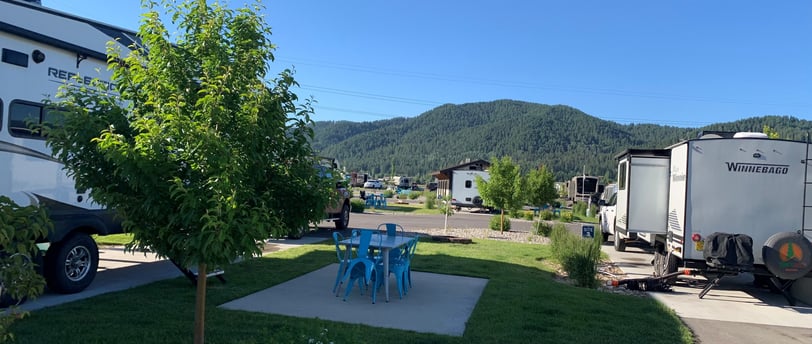The Hidden Gem of Real Estate: Why Investing in RV Parks Makes Sense
By Max Donovan, Non-Stock Investment Strategist
9/11/20244 min read


When it comes to real estate investments, the usual suspects like residential, commercial, or multi-family properties often take center stage. But for investors willing to explore niche opportunities, RV parks offer a uniquely attractive proposition. In the last decade, RV parks have emerged as one of the most stable and high-yielding real estate investments, combining solid returns, low overhead, and a business model that thrives even during economic downturns.
In this post, we’ll explore why RV parks have become such an enticing option for investors, what kind of returns you can expect, and why these parks are particularly resilient in tough economic times.
Why RV Parks Are Worth a Closer Look
RV parks might not immediately come to mind when you think of prime real estate investments, but they’re quickly becoming a favorite among seasoned investors for several reasons:
Stable Cash Flow: Many RV parks operate on a nightly or weekly rental basis, creating a steady stream of income. Unlike traditional real estate, where tenants are often locked into long leases, RV parks have shorter rental terms, allowing for regular rate adjustments to meet demand.
Growing Demand: The RV industry has seen remarkable growth over the past few years, fueled by the rising trend of outdoor recreation and the flexibility remote work offers. According to the RV Industry Association, RV sales hit a 40-year high in 2021, with over 600,000 units shipped in the U.S. alone. More RVs mean more people are looking for places to park, providing a constant influx of potential customers.
Low Maintenance Costs: Compared to other types of real estate, RV parks have relatively low overhead. There are no major structural concerns like roof repairs or plumbing overhauls to worry about. With most RV owners maintaining their own vehicles, the upkeep of the actual site is minimal, reducing costs dramatically.
Market Returns: What to Expect
The financial returns from RV parks can be compelling, especially when compared to traditional residential or commercial real estate investments. Here’s what investors can generally expect:
1. Higher Cap Rates
Cap rates (the ratio of net operating income to purchase price) for RV parks tend to be higher than those for traditional real estate investments. While residential properties might see cap rates between 4% and 6%, RV parks often offer cap rates in the 8% to 12% range, depending on location and amenities offered. This makes them an attractive option for investors seeking better immediate returns.
2. Cash-on-Cash Returns
Cash-on-cash returns for RV parks are also highly competitive, often falling between 10% and 20%. This is largely due to the relatively low cost of entry (compared to other types of real estate) and high levels of demand. Many RV parks can achieve strong cash flow relatively quickly, even with a modest initial investment.
3. Appreciation Potential
Although RV parks are often considered a cash-flow-focused investment, they can also appreciate significantly over time. This is especially true in regions where tourism is booming, or where RV travel is on the rise. As more Americans look for affordable vacation options, the demand for well-located RV parks will likely increase, driving up property values.
The Resilience of RV Parks in Economic Downturns
One of the most compelling reasons to invest in RV parks is their resilience during economic downturns. In fact, RV parks can thrive in times of financial uncertainty for a few key reasons:
1. Affordable Travel in Tough Times
When the economy tightens, people tend to cut back on luxury vacations. RV travel, however, provides an affordable alternative. RV parks offer lower-cost lodging options than hotels or resorts, and many families see RVing as a budget-friendly way to explore. Historically, RV park occupancy tends to remain stable or even increase during recessions.
2. Rise of Remote Work
The rise of remote work has opened up new opportunities for RV park operators. Many remote workers have embraced the “digital nomad” lifestyle, choosing to travel and live in RVs while maintaining their careers. This demographic seeks out RV parks not just for vacations, but for long-term stays, providing parks with a consistent revenue stream.
3. Minimal Defaults
Since most RV park guests pay upfront for their stays, the risk of non-payment or default is minimal. Even long-term residents tend to make regular payments, as RV parks offer flexible and affordable living arrangements. This means park operators are less likely to deal with the types of financial hardships that can impact traditional property landlords during economic downturns.
Location, Location, Location: Key to Success
Like any real estate investment, the location of your RV park plays a critical role in its success. The most profitable parks are often located near popular tourist destinations, national parks, lakes, and other outdoor recreation areas. Proximity to highways or major travel routes can also boost occupancy, as RVers often seek out easy-to-reach locations for overnight stops.
Some investors have even found success in acquiring parks in less tourist-heavy areas by focusing on long-term tenants or seasonal workers. For example, parks near agricultural or construction hubs may cater to workers who need temporary housing while on the job.
Managing the Day-to-Day Operations
Investing in an RV park isn’t entirely hands-off, but it’s certainly less labor-intensive than other forms of real estate management. The key to running a successful RV park is creating a welcoming atmosphere, maintaining clean facilities, and keeping up with regular landscaping and minor maintenance tasks.
Many investors choose to hire an on-site manager or property management company to handle day-to-day operations. With the right team in place, the park can essentially run itself, allowing the owner to focus on broader business strategies or other investment opportunities.
The Future of RV Parks: A Growth Industry
The RV industry shows no signs of slowing down. In fact, trends indicate that it will continue to grow as younger generations embrace outdoor travel and retirees seek affordable ways to explore the country. According to Kampgrounds of America (KOA), 2022 saw a surge in first-time RV buyers, with more than half of all campers being Millennials or Gen Z.
With this sustained growth, the future looks bright for RV park investors. As demand for outdoor recreation increases, so too will the need for quality RV accommodations. Investors who enter the market now can capitalize on this growing demand and position themselves for long-term success.
Final Thoughts
For investors looking to diversify their portfolios, RV parks offer a unique and highly profitable opportunity. With strong returns, low operational costs, and the ability to weather economic downturns, RV parks provide a level of stability that’s hard to find in other types of real estate.
Whether you’re new to real estate investing or a seasoned veteran looking to expand your holdings, RV parks are worth serious consideration. They may not be the first investment that comes to mind, but for those willing to dig a little deeper, RV parks can deliver the kind of returns and resilience that make them a hidden gem in the real estate world.
